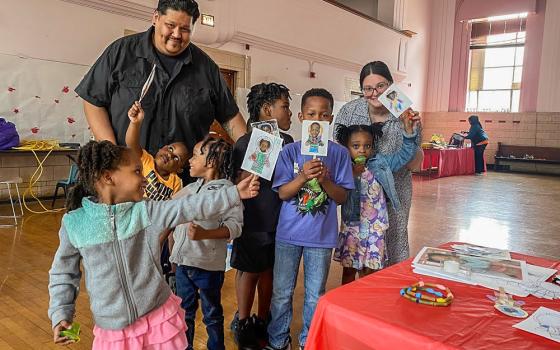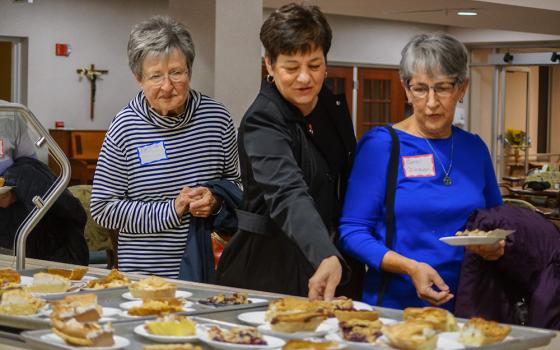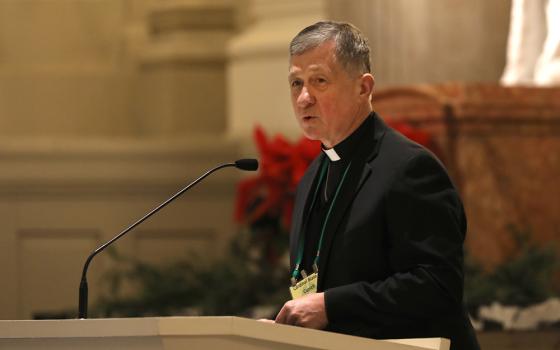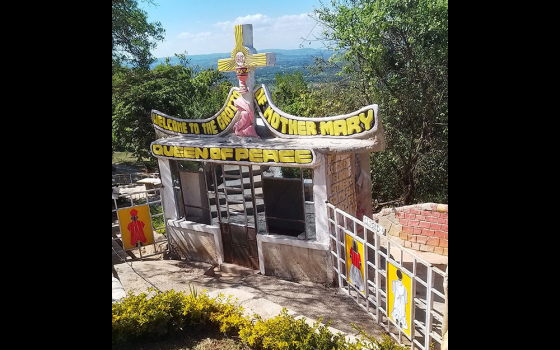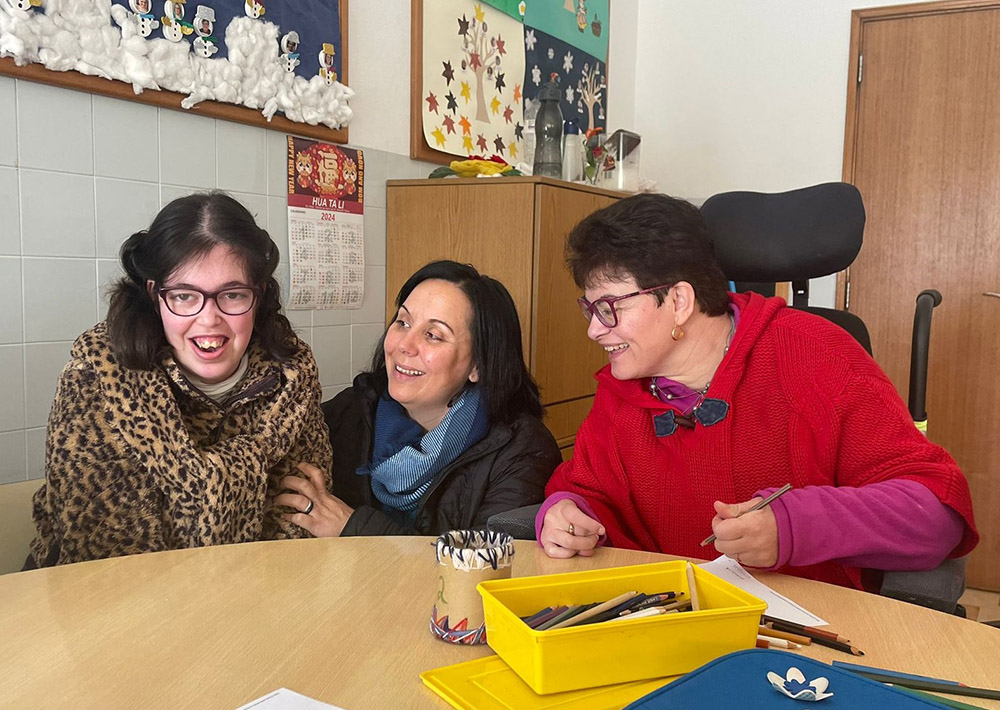
Sr. Ana da Paz Nunes (center), of the Franciscan Sisters of Divine Providence, interacts with two residents of the House of the Good Samaritan in Fátima, Portugal. One of the daily activities at the house is painting and drawing. (GSR photo/Leopoldina Reis Simões)
The first resident at the House of the Good Samaritan to greet visitors this January was Idalina Santos. She came from the kitchen, where she was helping to prepare lunch. She was smiling and happy with the work she was doing that day.
Beside her was Mariana Costa, who has lived there for 52 years and who that morning was helping the hairdresser who comes every week.
There was a general friendliness at the House of the Good Samaritan, from the employee who opened the door; from Sr. Ana da Paz Nunes, who has been president of the Social Center of Divine Providence for almost six years; from other staff; and, above all, from the residents, 87 girls and women, the youngest aged 18 and the oldest 94, all with mental disabilities.
Owned by the Franciscan Sisters of Divine Providence, the House of the Good Samaritan celebrates its 40th anniversary this year.
While Nunes recalls the early days of this project, which "was born poor at the service of the poorest," the girls — as all residents are called — with better mobility capacities come to greet visitors. They want to know who the visitors are, their names, their stories and why they are visiting. Their smiles and hugs are warm, not because of who you are but because that's how everyone interacts with each other and those who visit.
Depending on the abilities of each one, the girls are invited to collaborate on day-to-day tasks.
"The closer an institution with these characteristics gets to what a family is, the better the quality of life for all the people, those who live here and those who work here," said Nunes, 44, a native of the island of Madeira.
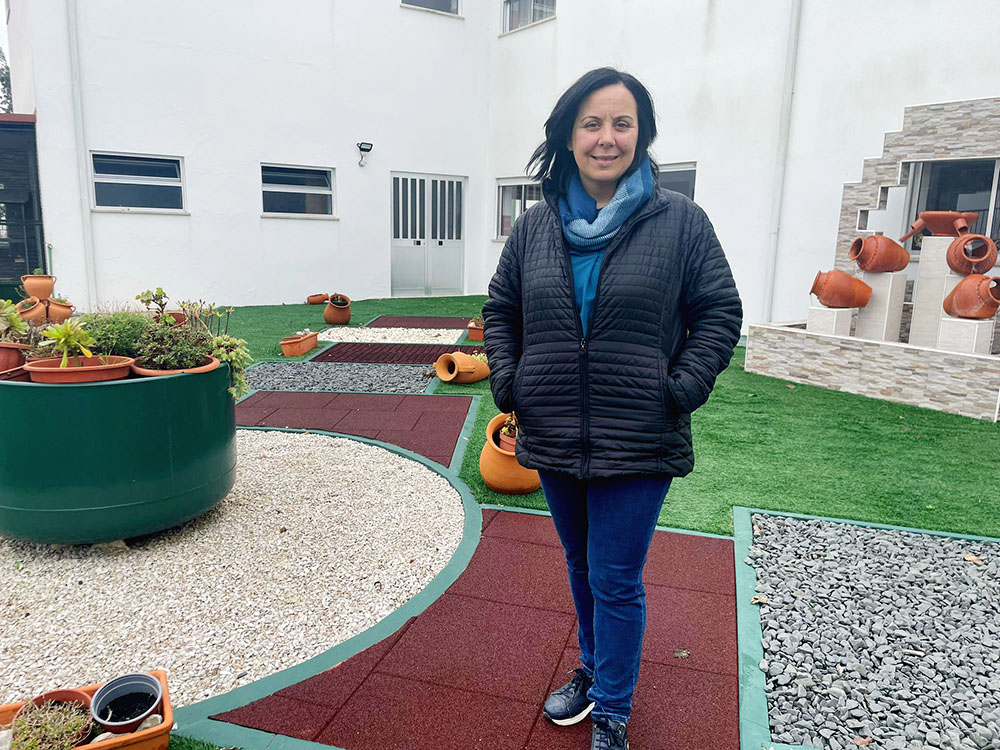
Sr. Ana da Paz Nunes, a Franciscan Sister of Divine Providence, in one of the House of the Good Samaritan's outdoor gardens, built during the COVID-19 lockdown in Fátima, Portugal (GSR photo/Leopoldina Reis Simões)
At 18, far from imagining she would become a nun, the young Nunes went to the House of the Good Samaritan with a group of friends to volunteer. That place and its charisma touched her so much that, at a moment of greater introspection, she asked to serve again as a volunteer.
A few years later, "almost 25 years ago, but it's not important to count the years because the important thing is to live them as a grace that God gives us every day," she professed vows as a religious. In addition to her religious training, she also trained to be a social work technician.
The long and wide corridors lead to the bedrooms; doctors' offices; the psychology, physiotherapy and music therapy rooms; the multisensory Snoezelen room; the kitchen and dining rooms; and administrative areas. Everything was clean and well-kept, decorated with works by the residents, photographs, religious statues and plants.
Some girls were helping with the services, and others were in the activity rooms, in different occupational workshops, making collages, embroidering, reading, writing and painting. In one of the rooms, a group was playing and singing, accompanied by Sister Zulmira, who is Timorese.
"Here, no one is more important than anyone else," Nunes said. "We live like a family, and everyone has their mission and role. The girls also have their tasks. As in families, we respect the taste and abilities of each one and call them to participate. It's good for them, and they feel useful."
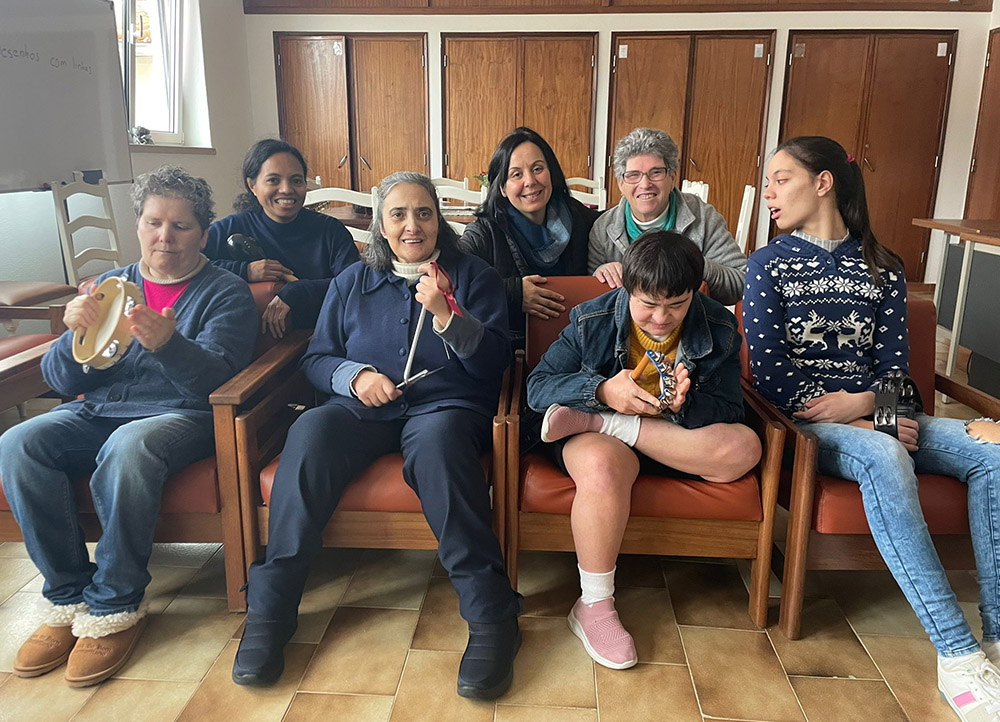
Music is part of the daily life of those who live at the House of the Good Samaritan in Fátima, Portugal. (GSR photo/Leopoldina Reis Simões)
In addition to this work within the institution, House of the Good Samaritan also raises awareness among families so that family ties are maintained, even though some residents no longer have close relatives.
"All the residents have a disability, but we all have a disability. Here, we learn to look at everyone as a person, as a being created by God," Nunes said.
"Everything here is the work of Divine Providence. Little by little, we've been building this house," Nunes explained, pointing to the white furniture in the pharmacy area, a gift from a religious articles store in the city. "They look new, don't they? We take advantage of what is given to us, and adapt and give new uses," Nunes said.
In her description of the project, the sister mentions its universality. "We have Portuguese, Ukrainian, Brazilian, Chilean and Timorese employees, as well as those of various religions. We are one big family. Cultural and religious diversity are highly regarded in this house."
Since 2009, the Social Center of Divine Providence added another project to the House of the Good Samaritan: the Nursery of the Good Samaritan, located in another building next to the house.
In the spirit of the project, Nunes explained, joint initiatives are carried out so that children can interact with the residents. "It's like in families, where there are people of all ages; it's a joy."
Three areas of the House of the Good Samaritan are special. The first is the small chapel that serves the community of nine Portuguese and Timorese sisters.
Advertisement
"We are at the heart of the house. We continue to act as our foundress did: We do everything we can on our part, and what we can't, we hand over to God so that God can do his part," Nunes said.
The second space is another chapel that serves the House of the Good Samaritan, where the Eucharist is celebrated daily. "Some residents also have catechesis. The spiritual aspect is important in their lives. They are sensitive to the problems of the world, pray, are informed and like to watch the news. I have a lot of confidence in their prayer. It's pure."
The third space, which is more recent, is the memorial garden that pays tribute to the two founders, Sr. Ana Amorim and Friar Adelino Pereira; to Sr. Maria José Lima, who dedicated herself to the house for many years and who recently died; and to all the residents who spent their lives in the institution.
Other places, particularly the small outdoor gardens built during the COVID-19 year, are also much appreciated by the residents in the summer.
Like all families, the House of the Good Samaritan has dreams and projects to fulfil. The biggest is to build an educational farm on its lands, open to visitors.
"We have the ambition and the space for an educational farm," Nunes said. "There isn't one here in the region, and our residents are sensitive to animals, as are the nursery school children. And we want to involve our residents in welcoming visitors."
It seems Nunes' days have more than 24 hours because of her many daily activities. "When something in our lives makes sense, we have time for everything: to pray, to work, to rest, to listen. ... God gives us time for everything."


